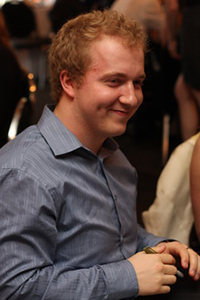ADAM GOODWIN
Adam Goodwin is the 2016 recipient of the GATA Award for Educational Leadership. Adam is a Master’s Candidate in the Faculty of Human Kinetics where he worked as a graduate teaching assistant for three semesters as well as a research assistant on a teaching and learning grant dedicated to understanding the teaching practices being used in the undergraduate Kinesiology program. Through this work Adam is leading change in the areas of curriculum development and refinement. Over two years, Adam has spearheaded a number of teaching and learning initiatives that have resulted in seven (7) peer-reviewed oral publications. Through these efforts he is leading initiatives for pedagogical information-sharing. Adam currently works with The City of Red Deer, Alberta as a Community Facilitator, leading the corporation’s non-market housing and homelessness files.
The GATA Network Coordinators conducted the following interview with Adam:
1. What was the most difficult part of the nomination process?
Letting go. When I started the process, I thought it was just another nomination process. The structure of the award process forces nominees to deeply reflect on their teaching and learning philosophies, strategies, successes, and areas for future growth. This helped me think deeper about teaching and learning than I had in the past. Eventually, I had to let go and complete the actual nomination package (it was submitted 30 minutes prior to the deadline!).
2. Had teaching and learning been a big part of your life before you won the award? How did the award change your views on teaching?
Yes and no. I did my undergraduate degree at a university with 60,000 students that is heavily focused on research. Many professors cared deeply about their students and teaching but their main focus, in part due to the institution’s tenure and promotion criteria, was research. The environment that I completed my degree in was one in which I left believing that research was the purpose of universities. It was not until I came to the University of Windsor that I realized how many opportunities there are in teaching and learning in higher education; the number of faculty, staff, and students who are putting tremendous resources into thinking about, researching, and leading a renewed focus on what it means to balance teaching and learning with many, many other time commitments that come with working in higher education. Along the way, I have met many individuals who have opened my eyes to realizing that it is okay to be great at teaching and learning, research, and service, or to just want to focus on one particular area.
3. How has the GATA Award impacted your life, if at all?
Yes, the award has. I am fairly quiet. There is a misconception that educators have to be these spunky, charismatic actors/actresses who jump on desks to get students’ attention and illustrate a point, which, unfortunately, I find, even really intelligent people believe. When colleagues and peers find out I received this award, I think it helps them move past their own assumptions about my skills and abilities (I have spoken in front of crowds of 3000+ twice with no sweat or butterflies), and assumptions they may have about what it means to be an educator. I think the award has helped others better understand me, and see that just because I have high enough self-esteem and confidence not to have to speak all the time (i.e., I reject many Western academic-centric views that the one who speaks the most is the most engaged or has the most knowledge or is the best, and that oral communication is the only way to share ideas), and that just because I am usually the guy sitting in some corner with earphones on doing work, I am just as comfortable being in front of a class/crowd/group as I am living in my own little world.
4.What is the most rewarding or best part about being a GA/TA?
I had the opportunity to be a graduate assistant for Functional Anatomy, one of Kinesiology’s tougher undergraduate courses. I was responsible for leading three weekly laboratories. I had taken a few physiology courses during my undergraduate degree, which made me quickly realize that physiology and anatomy, although closely related, are very different ways of thinking. So the most rewarding part was being humbled and having to re-think my original strategy of teaching the material (which my old brain had a tough time soaking up) to facilitating student learning. That was a big jump for me, but it made me appreciate different teaching philosophies and approaches, never to pretend that I know everything, or that I am the smartest person in the room (I had the students that scored in the 99 percentile in my lab…).
5. What is your favourite GA/TA memory?
It was likely outside the actual GA role; the many connections I built with students and the GA supervisors, through my GA roles, over the term are great memories.
6. Is there any advice that you would give others who are considering being nominated for a GATA award?
The process to compile the dossier will take time: 1) start early, 2) spend time thinking and planning what the dossier means to you and could look like, and 3) use it as a process rather than just the end result. I used the nomination process as a tool to reflect on what teaching and learning means to me, and how I would like to incorporate it into my life in the future. Oh, and start early.
Great work, Adam!
For more information regarding descriptions and criteria of the GATA Awards, visit the CTL Website.




Recent Comments